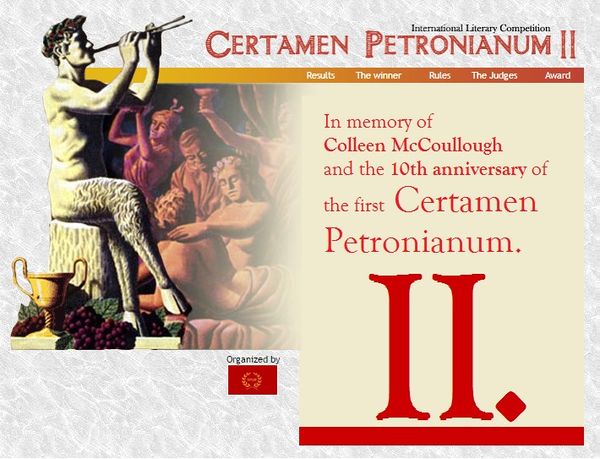Ludi Romani 2768 AUC

- This year we advertize the Certamen Petronianum II within the frames of Ludi Romani. Follow the link.
- Read our article about the ancient Ludi Romani
From the Office of Aedilis Curulis Q. Arrius Nauta
Q. Arrius Nauta aedilis curulis Omnibus in Foro S. P. D.
It is my pleasant duty to announce the Ludi Romani starting from today, and held between 12-19 September [PARTICIPATION EXTENDED until 4:00 p.m. EDT, September 21]. There will be lots of various games and events every day from tomorrow, and today is dedicated to Iuppiter Optimus Maximus. My colleague Aedilis Curulus C. Decius Laterensis offers the Opening Ritual to Iuppiter today within a few hours. I call you Citizens to dedicate a prayer today to Iuppiter Optimus Maximus, and I invite non-practitioners to dedicate their thoughts to the might of Rome and the greatness of Roman People, embodied as an idea in Iuppiter Optimus Maximus. With the Ludi Romani, we celebrate the greatness of Rome. This is the focus of the day for Nova Romans. I thank for the preparations of this Ludi Romani to Aedilis Plebis A. Iulius Paterculus. We the Aediles Curules have not even been fully invested (waiting for the end of curiate investment), so we needed help in preparation from Aedilis Plebis Paterculus. Thanks to C. Claudius Quadratus, Cn. Cornelius Lentulus and my colleague C. Decius Laterensis for the preparations.
I declare the LUDI ROMANI OPEN!
Valete,
QVINTVS ARRIVS NAVTA
AEDILIS CVRVLIS
Contents |
Program of the current ludi Romani
You can PARTICIPATE IN ALL CONTEST UNTIL 4:00 p.m. EDT, on September 21 (original deadline was september 19, it has been extended to Sept. 21)
- Opening ritual by Aedilis Curulis C. Decius Laterensis
- Chess Competition by C. Claudius Quadratus
- Short Essay Contest by Q. Arrius Nauta and Cn. Cornelius Lentulus
- "Love The Roman Poem" Contest by Q. Arrius Nauta and Cn. Cornelius Lentulus
- Virtual chariot races by P. Annaeus Constantinus Placidus. (Entries closed.)
- Certamen Historicum - history contest, see below:
Certamen Historicum
RULES
There will be four short sets of questions, worth a total of 40 points, to be posted at 4:00 p.m. Eastern Daylight Time on September 13th, 15th, 17th and 19th. The questions will be posed in English, but may be answered in any language.
ANSWERS ARE TO BE SENT ONLY TO: c.claudius.quadratus AT gmail.com
Anyone who by accident posts answers publicly will be disqualified from winning a prize.
Most of the questions will relate to events that took place during the time of the Republic. Several questions will be connected historically to the coinage. One set will have a military theme.
The answers to any set of questions may be submitted until 4:00 p.m. EDT, on September 21, 2015.
One bonus point will be awarded for any set of answers submitted prior to the posting of the subsequent set of questions. A total of 3 bonus points are available.
PRIZES
- First place - A genuine Roman coin in Extremely Fine condition;
- Second place - A genuine Roman coin in Very Fine condition;
- Third place - A genuine Roman coin in Fine condition.
Answers will be posted and prize-winners announced as soon as possible after 4:00 p.m. EDT on September 21st.
If you have any questions, please respond to this notice or write to c.claudius.quadratus AT gmail.com
Good luck to all contestants! (There always seems to be someone who by mistake posts answers publicly. Should that happen, the person who does it will be disqualified from being able to win a prize. Do not let this happen to you! Complete rules, procedures and information about prizes have previously been posted.)
Deadline for submission: 4:00 p.m. EDT, September 21, 2015. But note, if the answers are submitted before 4:00 p.m. on September 15th, one bonus point will be added to your score.
First Set of Questions (Accent on coinage) Total of 10 points
1. The first gold aureus was minted shortly before the installation of a "Dictator." What was the complete name of the future dictator and in what year was the aureus first minted? (2 points)
- Hint: It wasn't Gaius Iulius Caesar.
2. A lituus appears on the reverse of the first aureus. What is a lituus and who uses them? (2 points)
3. The silver coin known as a quadrigatus was first minted c.225 BCE. Why is it called a quadrigatus? (1 point)
4. Approximately when was the first sestertius minted? Of what metal was it made? (2 points)
5. Some silver denarii issued in 89 BCE bear the image of King Tatius. Some of those also bear the image of Tarpeia. Who were Tatius and Tarpeia? (3 points)
Second Set of Questions (Accent on military matters)
1. From the perspective of length of time, which two foreign leaders were Rome's most persistent enemies? (2 points)
2. Towards the end of the life of Augustus a military reversal profoundly upset him. What happened? Where and when? (2 points)
3. Describe the military device known as a "corvus." When and where was it first used in battle? (2 points)
4. Where is Eryx and what happened there in 244 BCE involving the Roman military? (2 points)
5. What is meant by the expression "to be put under the yoke" and how does that expression relate to an event that took place in 321 BCE? (2 points)
Third Set of Questions
1. Several Republic denarii bear images of a curule chair and/or fasces.
- What is a curule chair and who used them? (2 points)
- Describe fasces and their use. (2 points)
- What United States coin series bears the image of fasces? (1 point)
2. A shocking religious scandal took place in 62 BCE. Who was involved and what did he do? (2 points)
3. In what year was Octavian given the name Augustus? (1 point)
4. A tax upon the assets of wealthy women was decreed by the Second Triumvirate. A woman successfully campaigned against that tax. Who? (1 point)
5. Especially for the back alley dwellers of the Subura and our senior Censor: Did the Romans consider Pluto to be a planet? (1 point)
Final Set of Questions
1. Briefly define the terms "Optimates" "Populares" "Novus Homo" and name one person who fits each category (3)
2. The large size of the sestertius in the early Empire permitted lengthy legends. Here is the obverse legend of a sestertius of Trajan:
- IMPCAESNERTRAIANOOPTIMOAVGGERDACPARTHICOPMTRPCOSVIPP Here it is again, but divided into its elements:
- IMP CAES NER TRAIANO OPTIMO AVG GER DAC PARTHICO PM TRP COS VI PP
- Seven portions of the legend are underlined. Briefly explain the significance of each underlined part as it relates to Trajan. Do not discuss Latin grammar, case endings, etc. (7 points)
